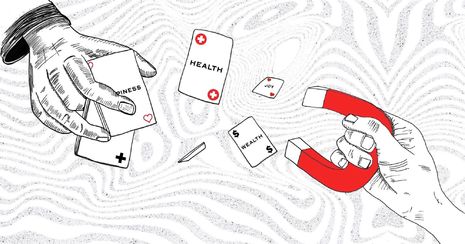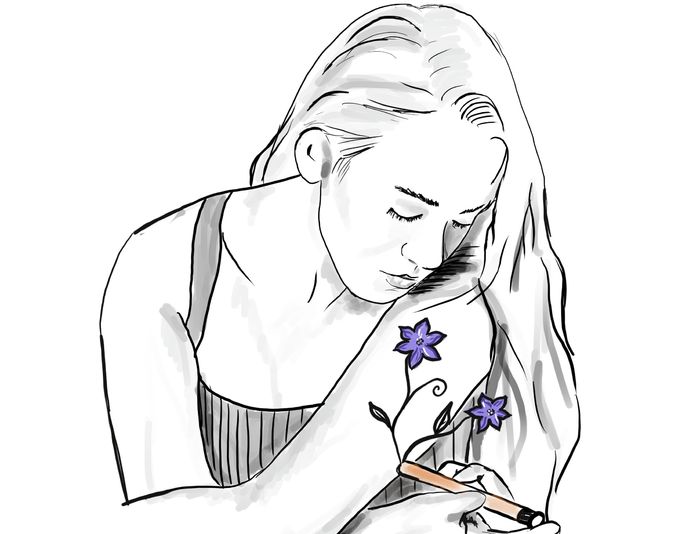The myth of manifestation, exposed at a hospital bed
How did Heather Bellamy realise you cannot ‘attract’ good health and recovery through a mask of positivity?

You hear the word ‘illness’ and envision a physical battle. Tests, scans, drugs, drips. A gaunt face and visible bones. A figure that limps and shakes. While my experience ticked every box on this list, I now know that this purely physical perception is misleadingly two dimensional.
My response to my diagnosis was disturbingly positive. As the words “Ulcerative Colitis” left this vacant doctor’s mouth, I felt neither dread nor fear but overwhelming relief. After weeks of passively observing while my body failed to exercise its basic functions, a diagnosis meant a roadmap — a route to recovery.
“They say that the person you are before your illness defines your capacity to cope”
In hindsight, this view was far too naïve. Very quickly, my hope was diminished. I realised that my case was the exception to the blueprint routinely revised by medical students. It was the kind of case forcing teams of doctors to gather around big white tables and strategise; the kind of case leading experienced nurses to stare at you in pity and tell you you’ve “been through so much”.
Being discharged from the hospital meant not flowers and cards but merely the countdown to my next admission. The walls of my bedroom came to feel more foreign than the curtains of hospital wards. Each new drug I placed my hope in came with a list larger than the span of my body of life-threatening side effects, without any efficacy. I was displaced from my body by medication and forced into the liminal space of existence.
They say that the person you are before your illness defines your capacity to cope. For me, this proved true in the most unexpected of ways. I’d spent years arming myself with what I perceived to be ammunition. The law of attraction and manifestation — the belief that positive thoughts attract positive things — was my bible. My shelves were stacked with books offering step-by-step instructions on how to attract prosperity into my life. My ears were drowned with podcasts suggesting that I was personally responsible for circumstances far beyond my grasp. Like many, I perceived this belief system as a catalyst for happiness and success. However, to blindly accept these ideas without challenge, solely due to the prospect of a shiny, new coping mechanism, was my biggest oversight.
I don’t doubt that manifestation can serve a purpose within the appropriate confines. When employed as a means of achieving frivolous desires, taking personal responsibility for the circumstances within your control can transform pessimism and fatalism into drive and determination. However, when our challenges go beyond superficial desires for a Dior handbag or a six-figure salary, manifestation proves not only redundant but damaging. The sinister iceberg beneath these romanticised beliefs is that you are to blame for your hardships.
“[...]if only I could employ a façade of positivity, I could attract happiness, health and recovery”
As an eighteen-year-old girl watching life pass by from a hospital bed, my identity usurped by the drug that was keeping me alive, the damaging impact of these beliefs became all too potent. I’d been programmed to think that if only I could better myself, if only I could employ a façade of positivity, I could attract happiness, health and recovery. Yet, policing my thoughts out of fear of welcoming negative emotions transformed my mind into a battlefield.
This mental turmoil far surpassed the extent of any physical symptom I had endured. The physical pain was tangible, it was localised, but these thoughts and emotions were beyond quantifiable. I passively observed an internal monologue between the voices on each of my shoulders. One spoke of blame, anger and shame, while the other attempted to reason; “surely I don’t deserve this pain”. As I desperately tried to make sense of this tale, to some sort of existential essay plan, I eventually concluded... sometimes shit just happens.
Self-affirmations in the hospital mirror were no prescription for my recovery. Forcing the corners of my mouth into a smile would not heal my ravaged organs. My ambivalent acceptance that the flaws lay not within my character but rather the beliefs that I ignorantly chose to embrace, was simultaneously frightening and liberating. As I began to welcome the natural emotions of sadness and rage, I surrendered to this mental battle and fixed my focus on the physical one before me.
Manifestation is the product of a superficial Western world and thus, is entirely rooted in privilege. While its emphasis on personal responsibility is ostensibly harmless, its focus on the weaponisation of positive thoughts and the suppression of negative emotions hinders its ability to provide holistic solutions to real-life problems. The children of Ukraine are in no position to attract safety and security through positive thoughts and to suggest such would be insulting. Rather, in circumstances where employing some Gatsby-like hope would amount to the denial of the difficulties before you, the illusion of control only serves to amplify the ultimate lack of it.
I am in no way grateful for my illness. This realisation did not need to exist as a by-product of trauma. However, my choice to replace toxic positivity with the non-judgmental expression of raw emotion has been one of the most valuable and transformative decisions that I have made.
 News / Uni Scout and Guide Club affirms trans inclusion 12 December 2025
News / Uni Scout and Guide Club affirms trans inclusion 12 December 2025 News / Cambridge Vet School gets lifeline year to stay accredited28 November 2025
News / Cambridge Vet School gets lifeline year to stay accredited28 November 2025 News / Cambridge study finds students learn better with notes than AI13 December 2025
News / Cambridge study finds students learn better with notes than AI13 December 2025 Science / Did your ex trip on King’s Parade? The science behind the ‘ick’12 December 2025
Science / Did your ex trip on King’s Parade? The science behind the ‘ick’12 December 2025 News / Pembroke to convert listed office building into accom9 December 2025
News / Pembroke to convert listed office building into accom9 December 2025








